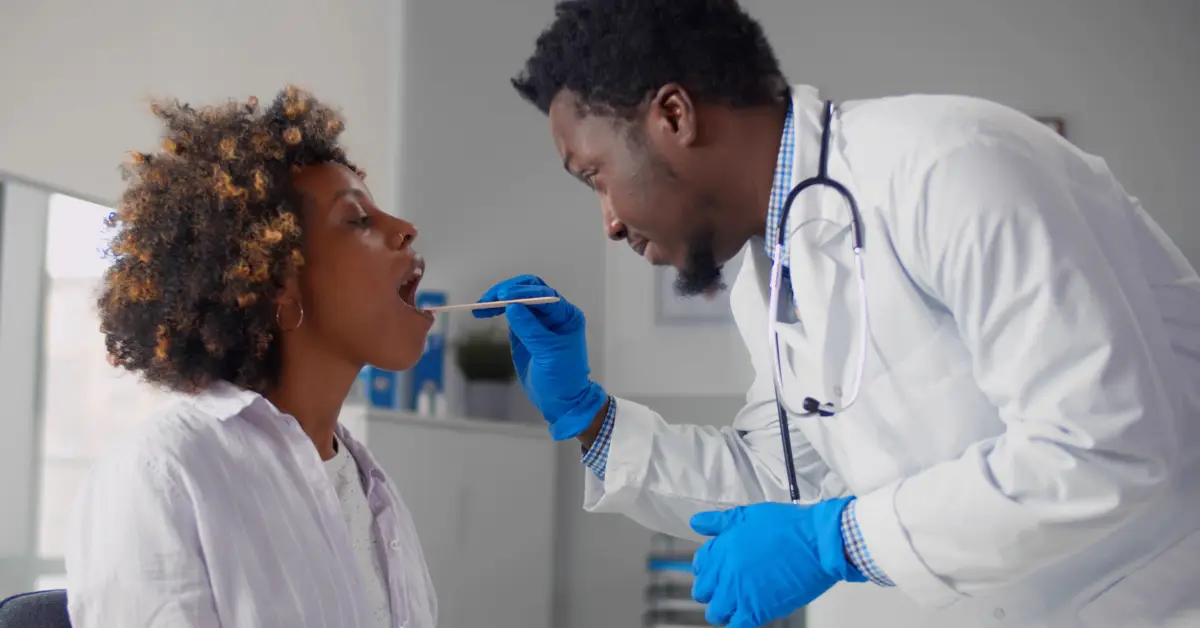Untreated strep throat can lead to complications
We have all experienced a sore throat at one time or another. In most cases it is caused by a virus, often a common cold or flu virus, in which case it generally becomes better on its own. Occasionally it has a more serious cause.
One of the less common throat infections is strep throat, which is caused not by a virus but by streptococcus bacteria. This is often more severe than your average sore throat and persists for longer.
If untreated it can cause complications. Such complications include inflammation of the kidneys and rheumatic fever.
Strep throat can occur at any age but is commonest in children. Strep throat can be treated with antibiotics as it is caused by bacteria, whereas antibiotics are ineffective as a treatment for a viral infection.
Causes
Strep throat is caused by streptococcus pyogenes bacteria, also known as group A streptococcus. Streptococcal bacteria, which are highly contagious, are spread through droplets that become airborne when a person infected with them coughs or sneezes.
They can be breathed in while airborne or land on a surface, from which they can be picked up by someone who touches them and then, perhaps, touches his or her nose, mouth or eyes. They can also be passed on through shared food or drink.
It is possible to catch the bacteria from someone who has it but is not showing symptoms of strep throat.
Symptoms
Symptoms of strep throat may include a throat pain that comes on quickly and makes swallowing painful. The tonsils may be red and swollen and may have white streaks or patches of pus. There may be tiny red spots at the back of the roof of your mouth.
Other possible symptoms are swollen and tender lymph nodes in your neck, fever, a headache, a rash, nausea or vomiting, especially in young children, and body aches.
These symptoms are similar to those for other illnesses and viral infections, so having them does not necessarily indicate strep throat. If you see your doctor, he or she may do tests specifically to test for strep throat.
Treatment
You should see your doctor or clinic if you or your child have, in addition to a sore throat, tender and swollen lymph glands, a fever, a rash, problems breathing or swallowing, or a sore throat that lasts for more than two days.
After examining you or your child, the doctor may, if he or she suspects strep throat, take a swab sample from the throat and perform a rapid antigen test, which can detect streptococcal bacteria within minutes. If the test result is negative he or she may send a swab sample to a laboratory for testing.
If strep throat is confirmed, or possibly even if not confirmed but strongly suspected, your doctor may prescribe an oral antibiotic.
If taken within 48 hours of the sore throat beginning, antibiotics should reduce the severity and duration of the symptoms, as well as reduce the risk of complications and the likelihood of passing on the infection to others.
If there is no improvement within two days of taking antibiotics, you should go back to the doctor. It is important to complete the course of antibiotics, even after you are feeling well again. If you do not, there is a risk of a recurrence of strep throat and of serious complications.
Over-the-counter pain relievers such as ibuprofen or paracetamol may be taken to relieve throat pain.
Lifestyle and home remedies
In addition to taking the prescribed antibiotic, have plenty of rest, as sleep helps your body fight infection. Drink plenty of water, as keeping a sore throat moist makes swallowing easier and prevents dehydration.
Eat foods that are easy to swallow, such as soup, mashed potatoes, mashed pumpkin and/or butternut, soft fruit, yoghurt and soft eggs. Avoid spicy food.
Gargling with salt water may help ease throat pain. Avoid things which may irritate your throat such as cigarette smoke.
Complications
Strep throat is not dangerous in itself but can lead to complications, such as infection of the tonsils, sinuses, skin, blood and the middle ear. It may lead to scarlet fever, kidney inflammation, rheumatic fever or poststreptococcal reactive arthritis and other inflammatory illnesses.
Poststreptococcal reactive arthritis causes inflammation of the joints, while rheumatic fever is a serious inflammatory condition that can affect not only the joints but the heart, nervous system and skin.
Prevention
Because the streptococcal bacteria are spread through airborne droplets from an infected person, the best way to prevent yourself becoming infected with it or, if you are infected, avoid passing it onto others, is through basic hygiene measures.
These include thoroughly and regularly washing your hands and covering your mouth when you cough or sneeze. Sneeze into a tissue and throw it away or, if you do not have a tissue, sneeze into your elbow. Avoid touching with your mouth drinking fountains or public telephones.
Also, it is best to avoid sharing drinking glasses or cutlery with other people, particularly with someone who has a sore throat and could have strep throat. Dishes and eating utensils should always be washed in hot, soapy water. Avoid close contact with those who are unwell.





